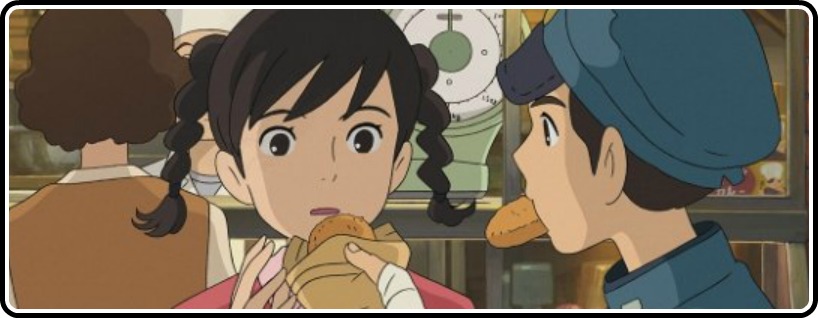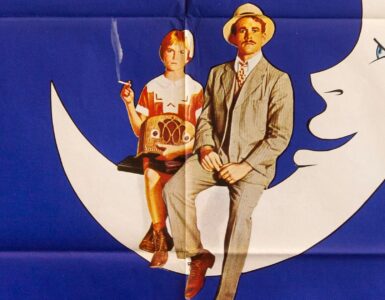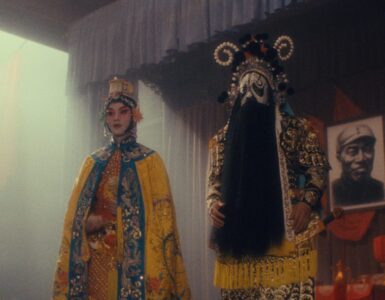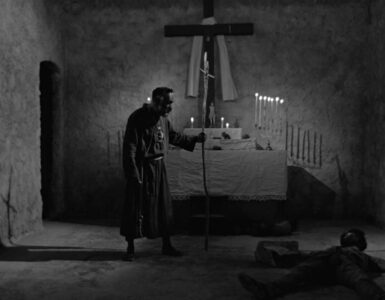As the world once again focuses on animation legend and film icon Hayao Miyazaki (partially due to a new film playing the festival circuit and partially due to his retirement), yet another film from his beloved Studio Ghibli, and one featuring a screenplay penned by he himself, is now finally on home video.
Directed by one Goro Miyazaki, the film is entitled From Up On Poppy Hill, and is one of the more interesting, if not one of Studio Ghibli’s biggest, films to date. A far more intimate picture than they company has become known for, this period picture follows the story of a burgeoning friendship between two high school students in Yokohama in 1963. With WWII still fresh on the mind of a reeling Japan and a pending Olympic hosting job on the forefront, this film is as gorgeous and lyrical a picture as you’re bound to see from any studio, animation house or big blockbuster corporation.
While promotion material for this film included the names Spirited Away and Howl’s Moving Castle, this film couldn’t be further away from those type of Ghibli masterpieces. A stayed and quaint picture that leaves the surrealism and fairy tales behind for something far more plaintive, this is one of the more intriguing pictures, aesthetically, to come from Ghibli in quite some time. Beautifully shot and animated, taking much of its influence both aesthetically and tonally from filmmakers like Ozu (there are shots that seem directly ripped out of any of his various pictures), this film is verdant, warm and routinely awe-inspiring, with as much heart visually as a film could ever have narratively.
The voice cast here includes the likes of (and this is promoted with the American version as the default, so that’s the one being reviewed here) Sarah Bolger and Anton Yelchin as the leading children Umi and Shun, and once again, the voice cast given to this Ghibli film is a superb one. Both Bolger and Yelchin fit the characters perfectly, the polar opposite of the types of voice casts given to films from the likes of DreamWorks or even Disney. Rounding out the A-list cast here are names like Gillian Anderson, Ron Howard, Aubrey Plaza, Burce Dern and even Jamie Lee Curtis, with the entire collection of thespians really bringing their A-game to the proceedings.
However, the script here, from one Hayao Miyazaki, is an absolute stunner. Like the picture aesthetically, the film’s narrative is both dense and rich with themes and yet almost entirely universal (save for one plot point revealed in the film’s final act, which makes it a bit esoteric). Taking a cue from films like those made by the aforementioned Ozu or, even more fitting, Keisuke Kinoshita, the film is both entranced by the central relationship and also a post-war Japan dealing with an aging generation that seems entirely opposed to the youth movement. A meditation on one’s connection to the past, the film is ostensibly an intrapersonal drama with a bit more on the brain.
Clocking in at just a smidge over 90 minutes, the film itself feels a tad long in the tooth, and the narrative is a bit lighter and breezier than most Ghibli pictures, but there is a bucolic charm to the picture, a real sense of ease that turns the film into a blissful story of a budding relationship. And it’s a hell of a home video release to boot.
Over three hours of supplements are found on this release, but it is the booklet that will catch your eye first. A gorgeous booklet featuring artwork, a letter by Goro Miyazaki, a project proposal from Hayao Miyazaki with the disc itself housing a speech and press conference given by Miyazaki-san. Along with that, is the original Japanese version of the film, feature length storyboards, a look at the celebrity voice cast, an interview with Goro Miyazaki, and a look at Yokohama, rounded out by the usual likes of trailers and TV spots. However, the transfer is key. A gorgeous HD transfer is found here, making the picture and even more so the brilliant score from Satoshi Takebe really shine. A warm and utterly inviting meditation on one’s relationship to both people and the past, From Up On Poppy Hill is a gloriously verdant picture from a studio not accustomed to making films like quaint and pastoral. A masterpiece of tone and visual storytelling, this film truly is. And a film not to miss as well.







![Bergman Island (The Criterion Collection) [Blu-ray]](https://criterioncast.com/wp-content/uploads/2022/11/bergman-island-the-criterion-collection-blu-ray-400x496.jpg)
![This Is Not a Burial, It’s a Resurrection (The Criterion Collection) [Blu-ray]](https://criterioncast.com/wp-content/uploads/2022/11/this-is-not-a-burial-its-a-resurrection-the-criterion-collection-blu-ray-400x496.jpg)
![Lars von Trier's Europe Trilogy (The Criterion Collection) [The Element of Crime/Epidemic/Europa] [Blu-ray]](https://criterioncast.com/wp-content/uploads/2022/11/lars-von-triers-europe-trilogy-the-criterion-collection-the-element-of-400x496.jpg)
![Imitation of Life (The Criterion Collection) [Blu-ray]](https://criterioncast.com/wp-content/uploads/2022/11/imitation-of-life-the-criterion-collection-blu-ray-400x496.jpg)
![The Adventures of Baron Munchausen (The Criterion Collection) [4K UHD]](https://criterioncast.com/wp-content/uploads/2022/11/the-adventures-of-baron-munchausen-the-criterion-collection-4k-uhd-400x496.jpg)
![Cooley High [Criterion Collection] [Blu-ray] [1975]](https://criterioncast.com/wp-content/uploads/2022/11/cooley-high-criterion-collection-blu-ray-1975-400x496.jpg)